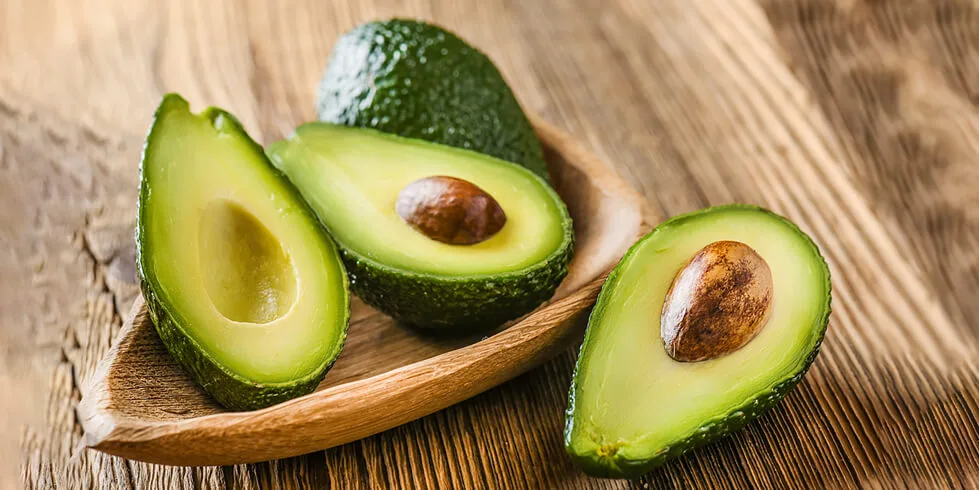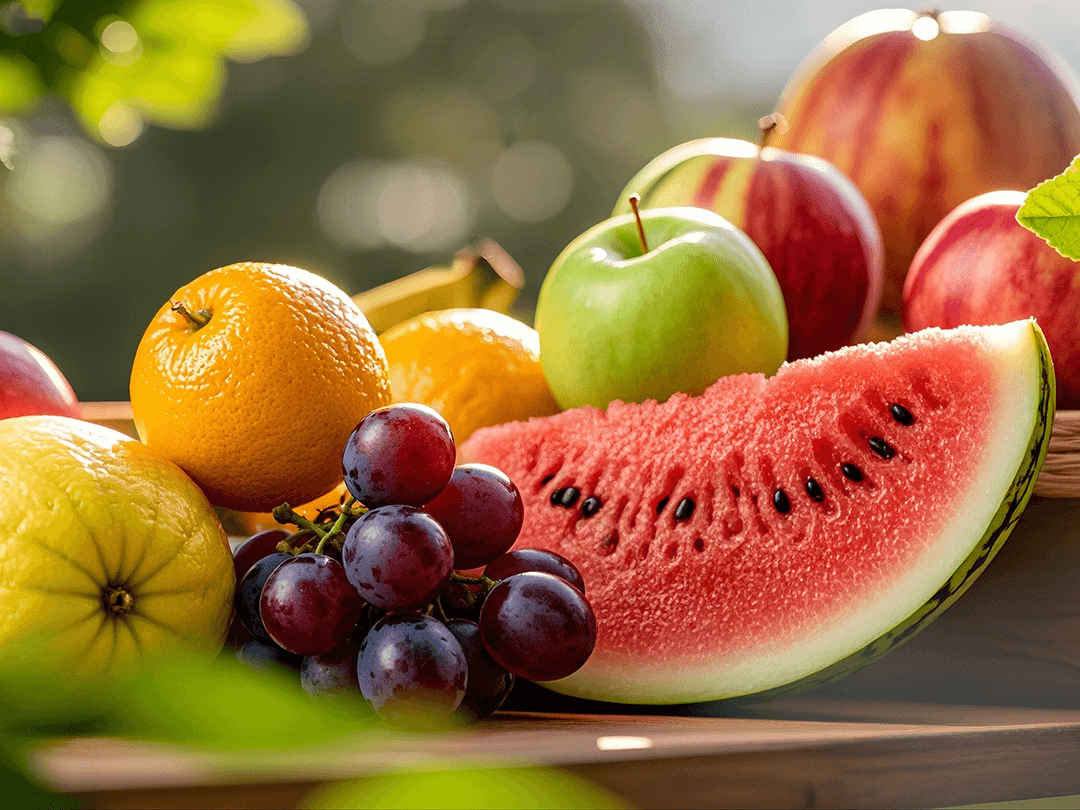The avocado is a pear-shaped fruit with skin that can be thick or thin, green or purplish black, and smooth or bumpy, depending on the variety. The flesh of the avocado is pale yellow-green and has the consistency of firm butter with a faint nut-like flavour.
Avocados are a great source of healthy fats, fiber, vitamins, and minerals; eating them can help improve overall health. The health benefits of avocados include promoting heart and digestive health, cancer prevention, radiant skin and hair, weight loss, and others.
We will discuss avocados’ 13 amazing health benefits. Avocado is a unique fruit with multiple nutritional and health benefits.
13 Amazing Health Benefits of Avocado
Avocados are flowering plants of the Lauraceae family, likely originating in south-central Mexico. The plant’s avocado fruit is botanically a large berry containing a single large seed. It is famous for its creamy texture and rich flavour.
The avocado is a bright green fruit with a large pit and dark leathery skin. The benefits of avocado for the skin are also not negligible.
1. It Reduces Cholesterol
Avocados are overfilled with beneficial fats, with a cup of sliced avocado supplying you with about 32% of your daily fat recommendation.
The fat is so good for you because it is monounsaturated fat, which may help lower bad cholesterol, which has many other benefits for your body, such as reducing stroke and heart disease risks. Another virtue of monounsaturated fats is that they may raise good cholesterol levels in your body.
2. It Contains More Potassium Than A Banana
Potassium is an essential mineral source most people don’t get enough of, but avocados will help. You can find 14% of your recommended daily potassium in an avocado – much more than the 10% in a banana.
High potassium consumption is linked to blood pressure, lowering the risk of strokes, blood pressure, heart attacks, and kidney failure.
3. They Promote Healthier Skin
You’ve probably seen skincare products made of avocado oils because of the minerals and vitamins found in avocados. These nutrients help soothe the skin. And they repair and protect it from damage induced by the sun and other elements.
Avocados are very rich in antioxidant properties. These come from the carotenoids, fat, and fatty acid content. Together, they help defend the skin from free radicals that can damage it.
Carotenoids help keep our skin’s appearance. It includes its density and tone. Vitamins C and E also contribute to healthier skin.
4 . Avocados Can Help Your Liver Cleanse
The stomach, gallbladder, and liver are relatively connected. About 80% of the immune system lives in the stomach. So, when the liver functions well, you also have good immunity.
Avocados have one of nature’s most potent antioxidants in the form of glutathione. Glutathione helps the liver filter out toxins and other harmful substances in the body. It is why most people who detox use it. Improving glutathione helps eliminate the body of toxic chemicals, toxins, and drugs.
Thanks to their antioxidants, avocados help strengthen your immunity. And they help the liver in cleansing the body of toxins
5. Diabetes
Avocado is one of the only fruits that doesn’t contain sugar. When eaten alone, they don’t significantly raise blood sugar much, so they aren’t even assigned a glycemic index value (a measure of a food’s effect on blood sugar levels).
They’re a great source of fibre, and eating a fibre-rich diet may lower the risk of type 2 diabetes.Research-based on national survey data found that people who eat avocados had a 50% lower odds ratio for metabolic syndrome than people who didn’t eat avocados.
Metabolic syndrome includes high blood sugar and more fat around the waist and increases the risk of having type 2 diabetes (heart disease and stroke).
6. Avocados Help Absorb Nutrients
Avocados contain nutrients that benefit mental and physical health, but they also help absorb other nutrients that benefit psychological and physical health! More specifically, avocados increase the number of carotenoids absorbed by up to six times.
Carotenoids such as lycopene and beta carotene are essential to good health and decrease the possibility of having health issues in various areas of the body, including the stomach and small intestine.
7. Avocados Help You Lose Weight
Avocados contain monounsaturated fatty acids, consisting of fats stored as slow-burning energy rather than fat. Studies have also demonstrated that including avocado in a meal increases fullness feelings while reducing the urge to eat.
If so, adding avocado to one’s diet could naturally reduce caloric consumption. Avocado is very low in carbohydrates and high in fibre, two essential attributes that assist with weight loss.
8. Avocados Have Pregnancy Benefits
Just one cup of avocado provides nearly a quarter of the recommended daily intake of folate, an essential vitamin that lowers the risk of congenital disabilities.
Also, avocado’s properties help in many other ways during pregnancy by preventing anaemia, improving digestion, balancing cholesterol and sugar levels, and reducing the frequency of leg cramps. Avocado also contains high choline levels, which aid babies’ brain and nerve development.
9. Avocado Lowers The Risk Of Depression
Avocados contain 20% of your daily recommended amount of folate, which may help lower your risk of depression. Folate does this by helping to inhibit the building up of homocysteine in the body.
A build-up of homocysteine can impair circulation, and the delivery of nutrients to the brain, interfering with serotonin production, dopamine, and norepinephrine, which regulate mood, sleep, and appetite.
10. Avocados Are Nutritious And Easy To Incorporate Into Your Diet
Avocados can be mixed successfully with many different foods and added to salads or eaten plain. Their fat, creamy, and rich texture blends well with other ingredients, making them incredibly versatile. They need time to ripen and feel slightly soft when ripe and ready to eat.
Our poached eggs and smashed avocado are one dish showing how delicious and easy avocados are to use. Avocado eaten as a breakfast dish will provide you with a significant intake of nutrients to start the day and help keep you feeling full for the morning.
11. They Maintain A Healthy Heart
Cardiovascular disease is one of the dominant causes of death today. People persistently get sick from high cholesterol levels and die from heart attacks and strokes.
Avocados can terminate unnecessary cholesterol from your body by giving room for beneficial and good cholesterol. All this helps us improve healthy hearts, which we all want.
12. Anti-aging
Avocados help the body remain young both on the out and inside. Making avocados a portion of your daily diet and avoiding other toxic foods can lower the risk of many age-related diseases, such as diabetes, memory loss, cancer, and arthritis.
Externally avocados will help to inhibit wrinkles by increasing collagen production and moisturizing the skin. To obtain immediate results, you can apply mashed avocado to your skin or face and let them absorb the toxins as it restores crucial nutrients to your skin.
13. They’re Good For The Eyes
Good vision is an integral part of our lives. That’s why we are persistently given recommendations on what to eat to improve our vision, what to do whenever we use our devices and other vital facts on preventing eye-related issues.
When you add this fruit to your diet, your body can form opposition from eye defects like cataracts. Avocado also contains powerful antioxidants like zeaxanthin, which are suitable for vision. Avocados are one of the best nutritious fruits known.
They’re packed with minerals, vitamins, and other nutrients. One of the fantastic things about these fruits is that they’re very healthy.
Your intestines contain a vast, growing ecosystem of microbes. These microbes are responsible for digestion in the body, and an imbalance can result in many disorders and diseases.
Avocado contains enough polyphenols to ensure a healthy amount of these digestive bacteria. So, get some avocados next time you’re in the marketplace.
Varieties
The two most commonly sold varieties of avocados in the United States are the Hass and Fuerte, both grown in California. The most popular variety, the Guatemalan Hass avocado, has thick, pebble-textured, and purplish skin and usually weighs no more than 12 ounces. The Fuerte avocado, a Guatemalan-Mexican hybrid, has a more pronounced pear shape and is slightly larger than the Hass.
It has shiny, thin, dark-green skin with tiny, raised, pale spots. Florida-grown varieties, which are Mexican and include the Booth, Waldin, and Lula, are more comprehensive, less costly, and more perishable than California avocados. In addition, they contain less fat and fewer calories and lack the rich, creamy flavor of the California varieties.
Uses
Avocados that are unblemished and heavy for their size are best. Ripe avocados yield slightly to finger pressure, but the avocado may be overripe if the finger leaves a dent.
Ripening can be hastened by enclosing the fruit in a paper bag and leaving it at room temperature. Ripe avocados should be refrigerated and used within 1 to 2 days. Because cooking destroys the flavor of avocados, it is not recommended.
Fresh avocados can be sliced and added to cooked dishes just before serving. They can be diced and mixed into salads, mashed to use in toppings or dips, puréed to use in cold soups and desserts, or julienned to include in sushi rolls.
When exposed to air, avocado flesh discolors quickly. Adding lemon or lime juice to mashed or puréed avocados can delay discoloration. Placing an avocado pit in a bowl of mashed avocados will not prevent discoloration.
Composition of Nutrients
Avocados are well-known for their high-fat content; however, most of that fat is monounsaturated. They are low in saturated fat and are sodium- and cholesterol-free. Avocados are a good source of dietary fiber. They also contain lutein, one of the carotenes, a phytochemical with antioxidant properties.
Eleven Side Effects of Avocado
Avocado, which has eleven possible adverse side effects, is the magical food recommended in almost every diet and for everyone. That being said, there are some things about avocados that you should be aware of. Here are eleven possible side effects you could encounter when eating an avocado.
1. Not suitable for pregnant and breastfeeding women
Avocado may seem like it’s ideal for every situation, but the truth is that pregnant and breastfeeding women should avoid it. Avocado reduces milk production and has even been known to damage the mammary gland, not to mention that babies’ stomachs are too sensitive to ingest avocado or its remnants.
2. Possible weight gain
While they are healthy fats, you could pack on the pounds if you eat too many avocados. They are very high in calories.
3. Liver issues
Avocado contains two components, alpha-tocopherol and anethole, which can cause damage to your liver.
4. Medication interactions
If you eat large quantities of avocado, it can interfere with the effectiveness of any anti-inflammatory medications that you’re taking. It is a significant potential danger because, let’s face it, if you eat any avocado, chances are you’ll eat a lot.
5. Stomach issues
People with a particular stomach may find that when they eat avocados, they experience some discomfort. It is usually in the form of bloating or flatulence, so be careful about eating it before going on any dates.
6. Allergies
Some miserable people may even experience an allergic reaction to the wonder that is avocado. If they do, they will likely have symptoms like hives, swollen skin, eczema and itching.
7. Latex intolerance
Avocados should be avoided if you are allergic to latex. Avocado is known to increase the level of serum lutein, which will heighten your sensitivity to avocado.
8. Lowers HDL cholesterol
Although it is one of the good fats, avocado works against you regarding nutrition. It reduces HDL cholesterol levels, which is the ideal type that your body needs.
9. Blood Thinner
In general, avocado works as a blood thinner, which can become a health issue if you are not careful. You must be especially careful if you take any medications because avocados may interact negatively.
10. Hypersensitivity
If you are hypersensitive, then avocado is another thing you should avoid. It has been shown to increase the effects and intensity of hypersensitivity.
11. High potassium
You want potassium, but everything is about the right amounts and balance. Avocados have a lot of potassium, which is perfect for raising your levels, but make sure you don’t consume too much. We’re not saying that you need to stop eating your avocado toast for breakfast; try to monitor how much you’re consuming.
The Author’s Message
I hope you enjoyed my blog about the 13 Amazing Health Benefits of Avocado. I’m not saying that avocado is the perfect food for everyone, but there are many health benefits. I encourage you to try avocado to see if it helps your health. If you’re uncertain about what to do, I would love to hear from you through this blog post.
Thank you for reading. I’m always excited when my blog posts can provide helpful information on a topic like this!
FAQs
The number of avocados that should be consumed in a day depends on a person’s individual needs and dietary requirements. Avocados are nutrient-dense and rich in healthy fats, fiber, vitamins, and minerals, making them a great addition to a balanced diet.
The recommended serving size for an avocado is about one-third to one-half of a medium-sized avocado. Eating one avocado daily is considered safe and can provide various health benefits. However, it is important to note that avocados are high in calories, so it’s essential to be mindful of portion sizes and calorie intake.
When deciding how many avocados to eat daily, it’s essential to consider your total daily calorie intake and your health goals. Limiting your avocado intake to one serving per day or less may be beneficial if you want to maintain a healthy weight. On the other hand, if you’re looking to gain weight, consider consuming more avocados.
Consuming one avocado daily is considered safe and can provide various health benefits.
Avocados offer numerous health benefits for women due to their nutrient-rich composition. They are a rich source of good fats, including monounsaturated and polyunsaturated fats. These fats can reduce the risk of heart disease and support healthy hormone levels. Avocados are also fiber-rich, promoting healthy digestion and reducing colon cancer.
Moreover, avocados contain vitamins C, K, E, B6, and folate, which support good skin, hair, and nails. Vitamin E, in particular, is linked to healthy reproductive function in women. Folate is also crucial for women, as it supports healthy fetal development during pregnancy.
Avocado is an excellent source of potassium, which regulates blood pressure, reduces water retention, and supports healthy bone density.
Yes, avocados can benefit your digestive system. One medium avocado has about 10 grams of fiber, making it a very rich source of dietary fiber. By thickening stools, controlling bowel motions, and providing food for good gut bacteria, this fiber can aid in the promotion of healthy digestion.
Polyphenols are also present in avocados, which boost the development and activity of good intestinal bacteria.
Additionally, avocados’ good fats can lessen inflammation in the body as a whole and in the gut, which may help soothe the symptoms of inflammatory bowel disease. All things considered, eating avocados as part of a balanced diet can have a lot of positive effects on gut health.
While no specific food can target fat loss in a specific area of the body, including the belly, avocados can be a helpful addition to a weight loss or weight management diet.
Avocados are high in monounsaturated and polyunsaturated fats, considered healthy fats. These beneficial fats enhance satiety, reduce inflammation, and enhance insulin sensitivity. Consuming avocados may aid in weight loss by increasing satiety and lowering inflammation, which could eventually reduce belly fat.
Furthermore, avocados are also fiber-rich, which regulates digestion and prevents constipation. A healthy digestive system can reduce bloating and improve belly appearance.
Remembering that consuming avocados alone will not lead to weight loss is critical. A comprehensive approach to weight loss, including a balanced diet and regular physical activity, is necessary to see significant results.
While there is limited scientific research on avocados’ sexual benefits, the fruit’s nutrient-rich composition can contribute to overall sexual health and function. Avocado is an excellent source of healthy fats, including monounsaturated and polyunsaturated fats. These fats can promote healthy blood flow and circulation, supporting healthy sexual function. Additionally, avocado is a rich source of vitamin E, which improves sexual health in both men and women. Vitamin E is an antioxidant that helps protect cells from damage, including those in the reproductive system.



